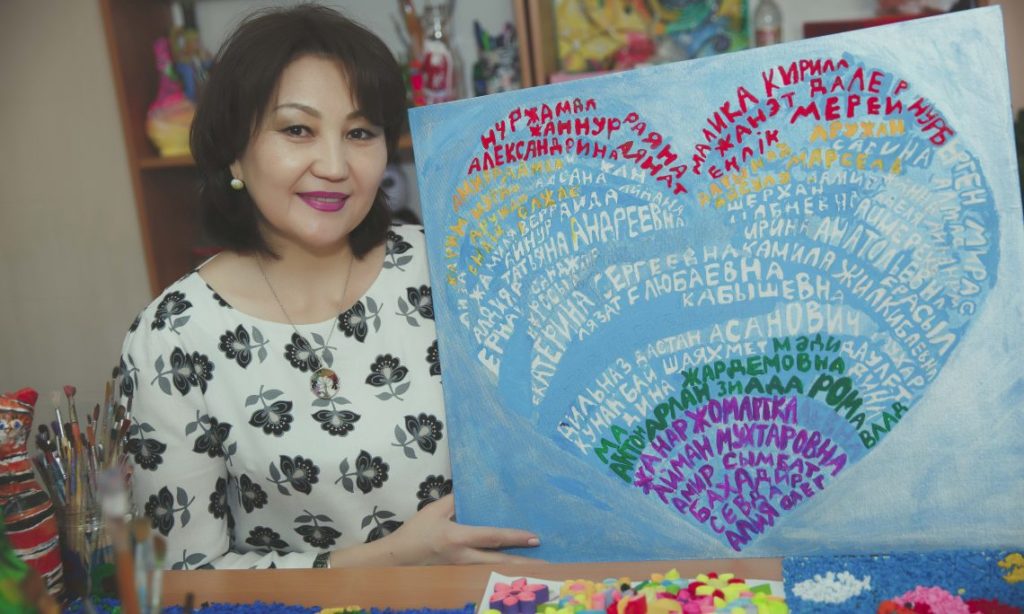NUR-SULTAN – Graduates of Maria, the first workshop for socially vulnerable women, find employment in the studio to help systematically address their problems, said workshop creator and social entrepreneur Lyazzat Alshynova.
“Maria social workshop was created to give opportunities to women in difficult circumstances, for them to change these circumstances by obtaining new skills… So, I wanted to support women with multiple children, single mothers, domestic violence survivors, mothers of children with disabilities. A woman will always understand another woman – if it’s not for us, who will support us?”
The idea was created by the mothers who participated in her other project and shared their grievances.
“It (the idea) was born out of our family neighbourhood clubs that are attended by mothers of children who talked to me about their problems. They have one desire, (that) they want to work, but they don’t have an opportunity to do so, because with four or five children, children get sick a lot and mothers have to be available for them… The same issue is with mothers of children with disabilities; they have special needs, (so) no one wants to employ them. You know the attitude of our society towards these people,” said Alshynova.
Maria has two goals. First, it aims to give women skills, as there is a class that teaches sewing and other skills, such as English taught by volunteers, that are useful for their careers. It also seeks to provide employment for workshop alumni by providing them with flexible hours at the studio selling goods made by women. The first five graduates found employment at the studio, even though they were free to work on their own after finishing the classes.
“I want these women to grow as people. So, by learning the craft, I want to give them more than just this skill. Currently, there are many personal growth classes available on the market, but they all are expensive. So, I invite my friends to coach these women, to give them the skills needed to get out of difficult situations,” she added.
Alshynova’s other projects include a crowdfunded inclusive playground launched with Astana Rotary Club and partially constructed by GreenTal employees, another social enterprise that employs people with disabilities; three family neighbourhood clubs that provide educational services to children and their parents free of charge; the real men school that supports boys raised in single-parent households; a neighbourhood hockey league that provides the equipment and opportunity for children from low-income families to play and a summer club that allows children from low-income families to visit capital attractions for free.
She is also a director of the non-governmental organisation Zamandas-21, launched in 2010 with the initial focus of providing children with an education.
Alshynova shared on what motivated her to start working on social projects.
“IVLP is an American exchange programme, I was on this programme in the United States in 2010, and after arriving back home, I immediately set up my own NGO and started to work on my projects. This programme has become an inspiration for me,” said Alshynova.
“If you want to do something, to change the world, at least talk about it and look around; there will always be a community of people who are also interested in the same issues. So, whenever I want to do something, I talk about it, I write my project down, I ask who would like to help – grants and other ways. We have a lot of partners. Our most successful project, Zamandas family neighbourhood club, has been supported by Samruk Kazyna Trust since 2014. This workshop project is supported by the U.S. Embassy. Our summer camp is also supported by Samruk Kazyna Trust. The hockey league was supported by the Canadian Embassy for a year, then by the U.S. Embassy and the Canadian Embassy and from this year by Samruk Kazyna Trust, as they saw how effective this project is and also because it doesn’t require a lot of money. Don’t think that you need millions, where you will find enough money. No, first of all, you need an idea, you need a dream; then, you need to calculate to see how much it costs and ask people for it,” she said.
Alshynova also shared plans regarding her projects.
“My long-term goal is for there to no longer be a need for projects like ours. But, currently, we are working on extending and expanding our projects, so we could systematically address these issues,” she said.

